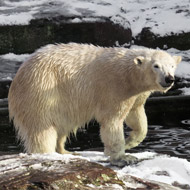Polar bears struggling to catch enough food

The polar bear population in the Beaufort Sea has fallen by around 40 per cent.
Polar bears are finding it harder to catch enough seals to meet their energy demands, according to new research.
The study, published in the journal Science, found that polar bears have much higher energy demands than previously thought and, as climate change shrinks sea ice, they are unable to find enough prey to meet their needs.
The study was led by wildlife biologist Anthony Pagano as part of his PhD research at the University of California Santa Cruz.
In the study, Pagano and his team monitored the behaviour, hunting success and metabolic rates of adult female polar bears in the Beaufort Sea. The bears were fitted with tracking collars - recording video, locations and activity levels - and metabolic tracers that revealed how much energy the bears expended.
The field metabolic rates they measured averaged more than 50 per cent higher than previous studies had predicted. Of the nine bears in the study, five lost body mass, meaning they weren’t catching enough fat-rich marine mammal prey to meet their energy demands.
“We found that polar bears actually have much higher energy demands than predicted,” said Pagano. “They need to be catching a lot of seals”.
Over the last 10 years, the polar bear population in the Beaufort Sea has fallen by around 40 per cent. Researchers have struggled, however, to study the biology and behaviour of these animals in such a harsh and remote environment.
Pagano continued: “We now have the technology to learn how they are moving on the ice, their activity patterns, and their energy needs, so we can better understand the implications we are seeing in the sea ice.”



 The latest
The latest